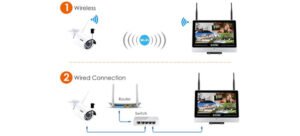Pros and Cons of Wired vs. Wireless Security Cameras
Security systems are a crucial part of safeguarding property, and choosing between wired and wireless security cameras is a significant decision. Each option comes with its own set of advantages and drawbacks, influencing their suitability for different settings and preferences.
Wired Camera Pros and Cons
Pros:
- No Batteries to Maintain: Wired cameras are directly connected to the power source, eliminating the need for battery maintenance.
- Steady Power and Internet Connections: With a physical connection, these cameras enjoy a more reliable power supply and internet connection.
- Internet Connection Options: Offers flexibility in how they connect to the internet, including through Ethernet cables.
- Internet-free Options Mean Zero Susceptibility to Hackers: Some wired systems can operate without an internet connection, significantly reducing the risk of cyber attacks.
- Higher-quality Videos: Typically, wired cameras can support higher video quality due to the stable connection.
- Local Storage Doesn’t Require Monthly Fee: Video footage can be stored locally without the need for ongoing cloud storage fees.
Cons:
- May Require an Electrician to Install: The installation of wired systems can be complex and might need professional assistance.
- Not Easy to Take with You If You Move: Due to their fixed installation, wired cameras are not as portable.
- Placement Limitations: The necessity for cables can limit where cameras can be placed.
Wireless Camera Pros and Cons
Pros:
- Easy to Install: Wireless cameras can be set up quickly without the need for professional installation.
- Easy to Move Around the House: Flexibility in placement allows for easy repositioning as security needs change.
- Easy to Take with You If You Move: The portability of wireless cameras makes them suitable for people who move frequently.
- Work Anywhere: As long as there is a Wi-Fi connection, these cameras can function anywhere within range.
Cons:
- Internet-free Options Uncommon: Most wireless systems require an internet connection to operate, limiting offline functionality.
- Cloud Storage Usually Requires a Monthly Fee: Unlike wired systems, wireless cameras often rely on cloud storage, incurring monthly costs.
- Must Keep a Close Eye on Batteries and Recharge as Needed: Battery maintenance is crucial to ensure continuous operation.
- More Likely to Use Wi-Fi, Which Can Be Unstable: Dependence on Wi-Fi makes them vulnerable to connection issues.
- Poor Wi-Fi Connections Lower Video Quality: Video quality is directly affected by the stability and speed of the Wi-Fi connection.
